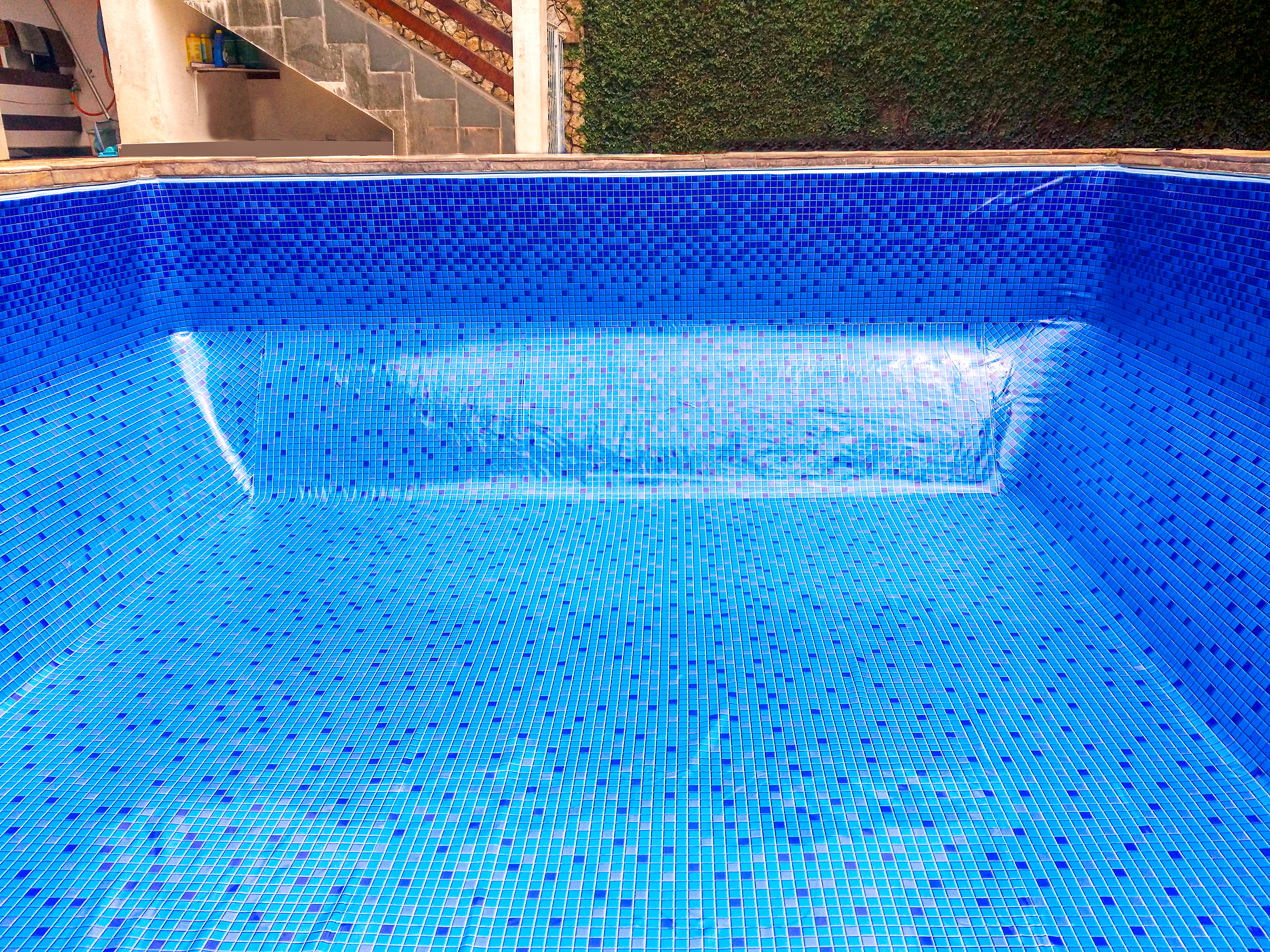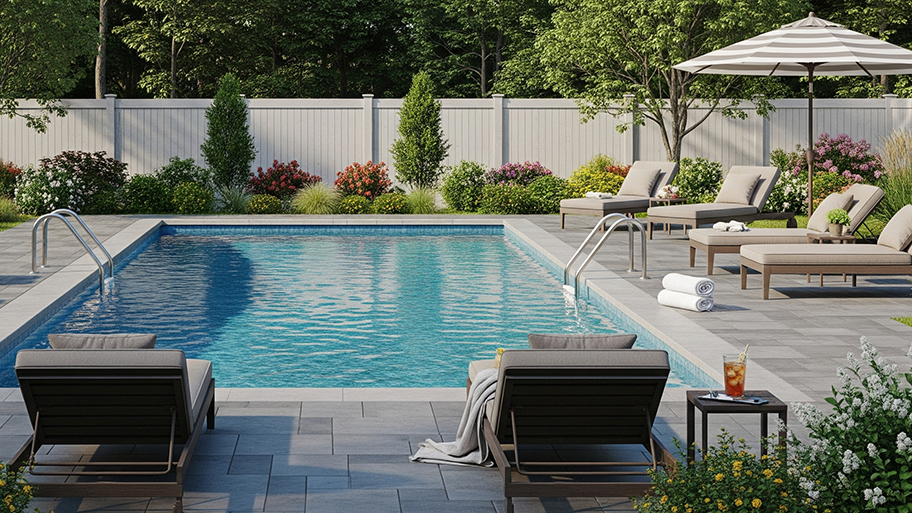
Need to update the look and feel of your pool? Use this guide on pool liner replacement cost to see how much this pool project will set you back.
In-ground pool costs in Washington D.C. range from $46,500 to $98,893 when you factor in the site preparation, the size of the pool, additional features like a slide or hot tub, and more. On average, homeowners pay $71,948.


Warm summers mean you’ll have plenty of time to take advantage of an in-ground pool.
Washington D.C.’s property tax rate is below the national average, so your taxes won’t go up as much as in some other cities.
Yearly pool maintenance will require opening and closing the pool before and after the summer.
Installing an in-ground pool can amp up excitement for summer, but before you dive in, you’ll need to understand in-ground pool costs in Washington, D.C. On average, homeowners in our nation’s capital spend around $71,948 to install an in-ground pool. Depending on the features you choose, how big the pool is, and the pool type, you can expect to pay between $46,500 and $98,893. Your local in-ground pool company will be able to give you a quote to help you plan for this expense.
Building an in-ground pool is an investment, but one that can increase your satisfaction with your home as well as your home’s value. Before you start the project, it’s important to look at the different cost factors that will ultimately make up the total cost of an in-ground pool in Washington, D.C.
There are three main types of pools to choose from when you’re planning an in-ground pool project. Each material comes with its own pros and cons. Washington, D.C. is a good candidate for all of these materials.
Vinyl: Vinyl pools are often more budget-friendly than fiberglass or concrete. The vinyl liner will need to be replaced about every 10 years, which can add to long-term maintenance costs but will extend the pool’s life if done properly.
Fiberglass: Fiberglass pools aren’t as customizable as concrete because they are prefabricated. But this also means they aren’t as expensive and they’re easier to install.
Concrete: Concrete is highly customizable as it can be poured to create any shape. It can be further customized with tile, polished aggregate, or plaster. It is, however, the most expensive pool type.
| Material | Cost | Pros | Cons |
|---|---|---|---|
| Vinyl | $40,000–$75,000 | Less expensive than fiberglass and concrete, small tears in the liner can be patched | Liners need to be replaced every 10 years |
| Fiberglass | $55,000–$100,000 | Prefabricated for easy installation, patch kits are available for small cracks | Not as many customization options as a concrete pool, gel coat can crack |
| Concrete | $65,000–$120,000 | Highly durable and customizable | More complicated installation, should be resurfaced every 10 years |
Size is one of the major factors in determining the final cost of the project. Pool costs range from $90 to $150 per square foot to install, and you can use this range to get an estimated cost range for your in-ground pool. Check out the table below to see cost ranges for various popular pool sizes. If you want to build a custom pool, you can ask your contractor how different in-ground pool shapes will affect the cost.
| Pool Size | Average Cost | Cost Range |
|---|---|---|
| 10x10 (100 sq. ft.) | $17,500 | $9,000–$25,000 |
| 12x24 (288 sq. ft.) | $25,200 | $25,920–$72,000 |
| 14x28 (392 sq. ft.) | $34,000 | $35,280–$98,000 |
| 15x30 (450 sq. ft.) | $39,400 | $40,500–$112,500 |
| 16x32 (512 sq. ft.) | $44,800 | $46,080–$128,000 |
| 18x36 (648 sq. ft.) | $56,700 | $58,320–$162,000 |
| 20x40 (800 sq. ft.) | $70,000 | $72,000–$200,000 |
Adding an in-ground pool comes with additional costs to cover site prep, lighting, fencing, and other necessities, but you may also want to include features like a slide or hot tub to make pool days even more fun.
Pool lighting: $200 per light
Solar pool cover: $75–$300
Hot tub: $5,000–$20,000
Slide: $1,500–$20,000
Landscaping: $700–$3,300
Pool fence: $1,500–$10,000
Site prep: $500–$3,020
Yearly pool maintenance cost: $120–$5,000
Though the average low for January is 30 degrees Fahrenheit, it can often get much colder throughout the winter months, dipping down into the 20s or slightly lower. Temperatures in the summer reach an average of 88 degrees Fahrenheit, with highs into the mid- to upper-90s. The hot season lasts from May to September, giving you lots of time to enjoy a pool, but you’ll have to close it in the winter to prevent any cold-weather damage.
In-ground pool costs go beyond purchasing the materials. You’ll also need to factor in labor costs, building requirements, and permit costs as well as how the in-ground pool installation will affect your home value and, ultimately, your property taxes.
Your local in-ground pool company will be familiar with building code and safety requirements, which may include fencing requirements, pool alarms, gates and latches guidelines, and more.
The District of Columbia requires a swimming pool permit for the construction of a swimming pool, and you may need separate permits for water system installation. Your local contractor will know exactly how to obtain the correct permits as well as how to order any required inspections.
Installing a pool requires a significant amount of labor, and labor costs make up between 25% and 50% of the total cost to install an in-ground pool. If the contractor calculates the labor hourly, you can expect to pay between $55 and $150 per hour. When you get your estimate, make sure labor costs are included and that you know how they’re calculated.
The real property tax rates in Washington, D.C. are calculated based on the property’s classification. Residential properties are taxed at a rate of $0.85 per $100 of the property’s assessed value up to $2.5 million. The rate increases to $1 per $100 for residential properties with no more than two dwelling units that have an assessed value higher than $2.5 million. Because a pool will increase home value, you can expect your property taxes to go up once the pool is installed and the property is assessed.
Nationwide, pools typically increase home value and offer a return on investment between 5% and 56%. In Washington, D.C., an in-ground pool can add between 10% and 15% to your home’s value. Because the winters are cold, you may not get as great of a value increase as you would in climates that are warmer year-round.
Home is the most important place on earth, which is why Angi has helped more than 150 million homeowners transform their houses into homes they adore. To help homeowners with their next project, Angi provides readers with the most accurate cost data and upholds strict editorial standards. We survey real Angi customers about their project costs to develop the pricing data you see, so you can make the best decisions for you and your home. We pair this data with research from reputable sources, including the U.S. Bureau of Labor Statistics, academic journals, market studies, and interviews with industry experts—all to ensure our prices reflect real-world projects.
Want to help us improve our cost data? Send us a recent project quote to [email protected]. Quotes and personal information will not be shared publicly.
From average costs to expert advice, get all the answers you need to get your job done.

Need to update the look and feel of your pool? Use this guide on pool liner replacement cost to see how much this pool project will set you back.

The cost of pool liner replacement in Columbus depends on the size and shape of your pool, as well as the liner material and type. Here’s how the costs break down.

Spool pool costs vary based on the design and materials, but they’re relatively affordable and space-saving compared to traditional pools. Here’s a cost breakdown.

Dreaming of getting in those daily laps without tearing up your backyard? Here’s what to know about endless pool costs so you can plan your project.

Everything was going swimmingly, but now your pool heater is not working properly. Here are some troubleshooting tips to get you back in business.

Swimming pools come in many sizes, but this pool size chart will simplify your choices and give you tips on how to choose the perfect size for your space.